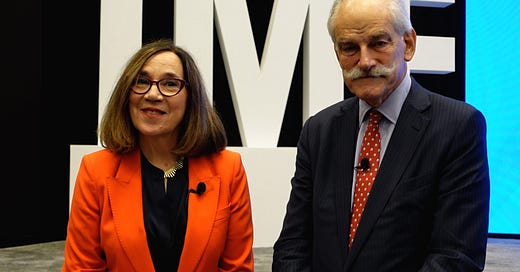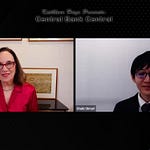John Lipsky is synonymous with International Monetary Fund.
He spent the first 10 years of his career working on issues surrounding exchange rates, capital markets, and representing the IMF in Chile and other Latin American nations. He left the Fund to forge a successful career on Wall Street, leading economic research teams at Salomon Brothers and JP Morgan among others, culminating in his job as vice chairman of JPMorgan Investment Bank.
The lure of the IMF proved too strong to resist especially when internal problems necessitated not only a strong hand but also passion for the work it does. John returned to be First Deputy Managing Director and then to commit to a second term as Acting Managing Director back when internal problems percolated at the Fund.
I share all of this so as you listen to what John has to say about the tariff policies the Trump adminstration is imposing on the rest of the world, the impact it will have on poorest nations, and his clear, focused, explanation of why the IMF, along with the World Bank, are institutions essential to the global economy.
The danger of tariffs-destruction & confusion 00:01:46:11
Well, <tariffs> threaten to be very destructive. It's part of the problem, as we've heard over and over again already in these meetings, is that, first of all, the US government has taken a very aggressive position, but it appears to be taking action via tariffs for multiple reasons, some of which seem to be in conflict with each other. And as a result, there's a sense of lack of clarity about exactly what goals predominate, what is going to guide the evolution of these policies.
Confusion and prevarication 00:02:24:02
And of course, everyone has been struck by the toing and froing of the announcing very astoundingly high tariff levels, then postponing them, perhaps what we heard this morning from the secretary of the Treasury is the possibility that these 90 day postponements could be stretched out. The reciprocal tariffs. Exactly. Could be stretched out depending on the state of play of the discussions, etc..
Once upon a time trade was a godsend for growth 00:04:26:18
And the hope that one of the principal design efforts of the postwar order and the institutions that created the postwar order were to reduce those barriers, to promote growth and to promote growth, promote trade excuse me, promote trade as an important spur to economic growth and recovery from 1950 to 2007. In fact, global trade grew faster than global GDP. In other words, trade was boosting global growth. Right. And that was a period of probably the 60 fastest years of global growth ever. From 2007 into 2024 growth in global trade has been slower than global GDP growth. In other words, since the global financial crisis. Trade has been a drag on global growth, and this has been the slowest sustained period of global growth since World War Two.
Risk from tariffs 00:05:27:07
Okay. Now, the risk is this new effort. We'll have to see what it turns out to be in the near term, if it threatens to reduce global growth, not just slow it, but reduce it. And naturally, that's seen as a threat to the stability of global growth. And the I guess part of the problem here is that the levels of the tariffs that the U.S. has announced have <in their first incarnation> gone back to apparent levels that were last seen a century ago and most people felt contributed to making the Great Depression.
An inconsistent rationale and application 00:06:11:05
…the final word here is… the notion that any country that had a trade surplus with the US was a sign of unfairness, and therefore the tariffs were going to correct this unfairness. Oddly, tariffs were announced for countries with which the US has a trade surplus.
Art of the deal; or deal from the bottom of the deck 00:07:48:21
…you could call <this> a tactic of negotiation. You know, you can call it bullying, call it whatever you want. But, the secretary explained this morning that there was a difference in the nature of the problems with different countries. With India, as he described, it they have very high tariffs, so the focus is on lowering tariffs. If they lower tariffs and it's you seemed to be quite optimistic that there was going to be to be real progress. Would that be a good sign? Of course it would be a good sign! It would be a sign that maybe the ultimate goal will be escalate to de-escalate. But what's a bit uncertain is it looks like the announcement was that there's a 10% base tariff on everything from everybody.
US focus is on trade in goods not in services 00:08:45:00
It's there's just a lack of clarity. And even though, as I said earlier, growth in trade, I should make clear growth in trade in goods has been slowing. Trade in services has been strong. Yeah. And, so far, the tariffs we've announced haven't touched services, but for example, we're sanctioning Europe on the basis that they have a trade surplus with us. But that's in goods. We have a trade surplus with of with them in services. So are we inviting them to now retaliate against us? This is, as you can see, considering that I'm repeating myself, but the whole idea of the postwar order was to liberalize trade, to boost trade, and by that boost global growth. These measures seem to threaten to take things the other direction.
The IMF and World Bank are special institutions 00:10:38:08
…there's an important aspect of the Bretton Woods institutions, the funded bank. First of all, as opposed to some other multilateral institutions, they are designed to be able to act and to act even in a situation in which there's not complete consensus. In other words, it's a body that the very structure, because the decision on action depends on a vote. In almost all cases, a majority of the vote voting power within the institution. Moreover, the executive board that takes executive decisions is chaired by the managing director who sets the agenda. In other words, it's designed to be able to act even when there's disagreement among major countries. And because it's treaty based. This may be a detail for some folks, because it's treaty based, that means that the decisions of the executive board have the force of international law. Wow. It's not just a bunch of diplomats discussing in the green. It has. It has the force of law. So is this would this be a good idea for the US to withdraw? There was a wonderful explanation published in the Financial Times a few days ago by Ted Truman, former Fed and Treasury official, explaining why it made no sense at all for the U.S. to withdraw from the IMF because it would be sacrificing forfeiting a position at the top table in terms of international monetary arrangements. Then you'd find the world would go on without the U.S. and the U.S. would be very much left behind.
JOHN LIPSKY
Most recently, John Lipsky was first deputy managing director of the International Monetary Fund; previously held positions of vice chairman of JPMorgan Investment Bank, chief economist at JPMorgan Chase, chief economist and director of research at Chase Manhattan Bank, and chief economist and director of the European Economic and Market Analysis Group in London at Salomon Brothers; early in career, spent 10 years at the International Monetary Fund, helping manage the fund's exchange rate surveillance procedure, analyzing developments in international capital markets, participating in negotiations with several member countries and serving as the fund's resident representative in Chile; currently is co-chair of the Aspen Institute's Program on the World Economy; is an Executive Director of the National Bureau of Economic Research and serves on the advisory board of the Stanford Institute for Economic Policy Research; is a Director of the Center for Global Development, and a life member of the Council on Foreign Relations; PhD, economics, Stanford University














Share this post